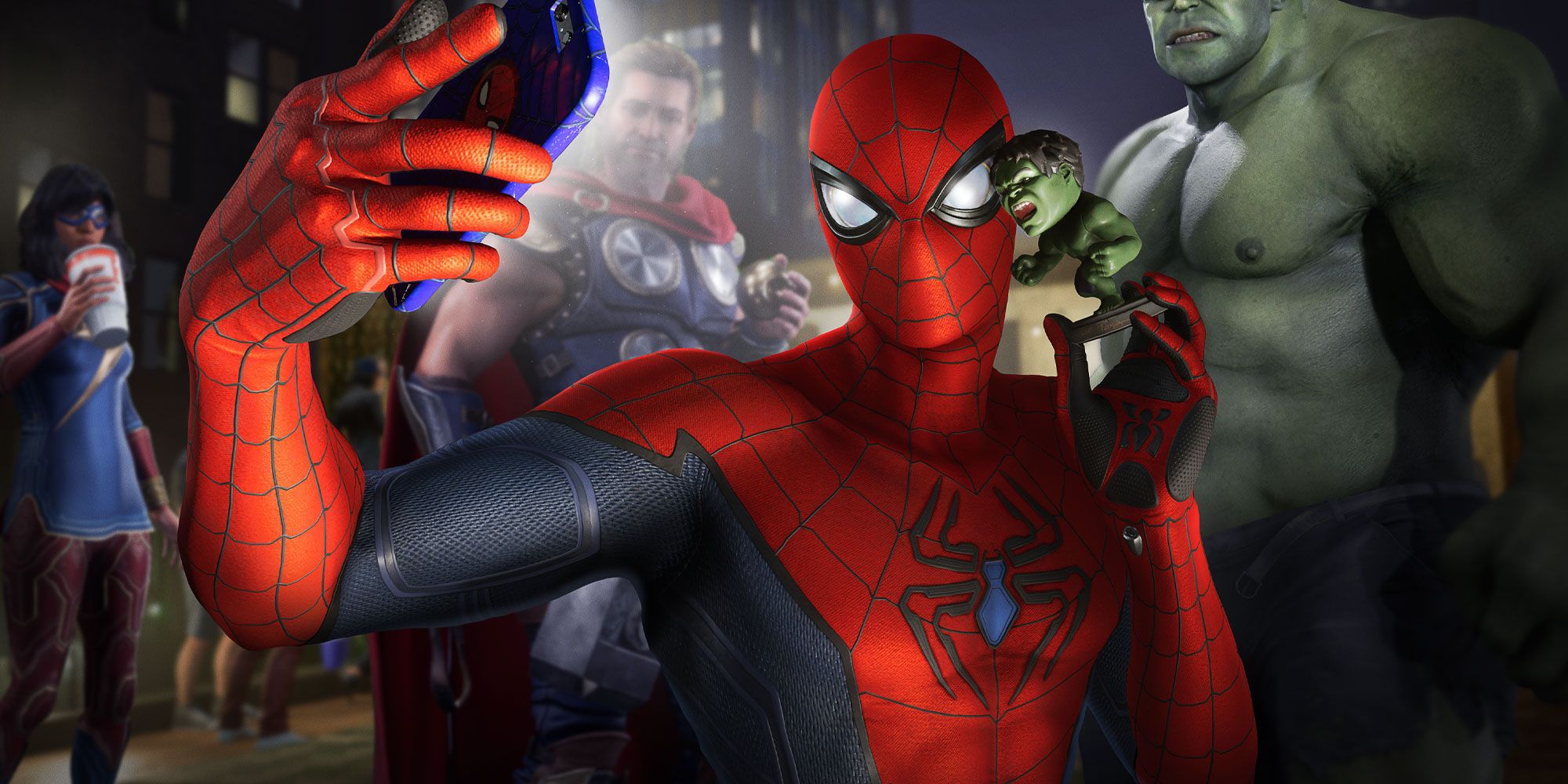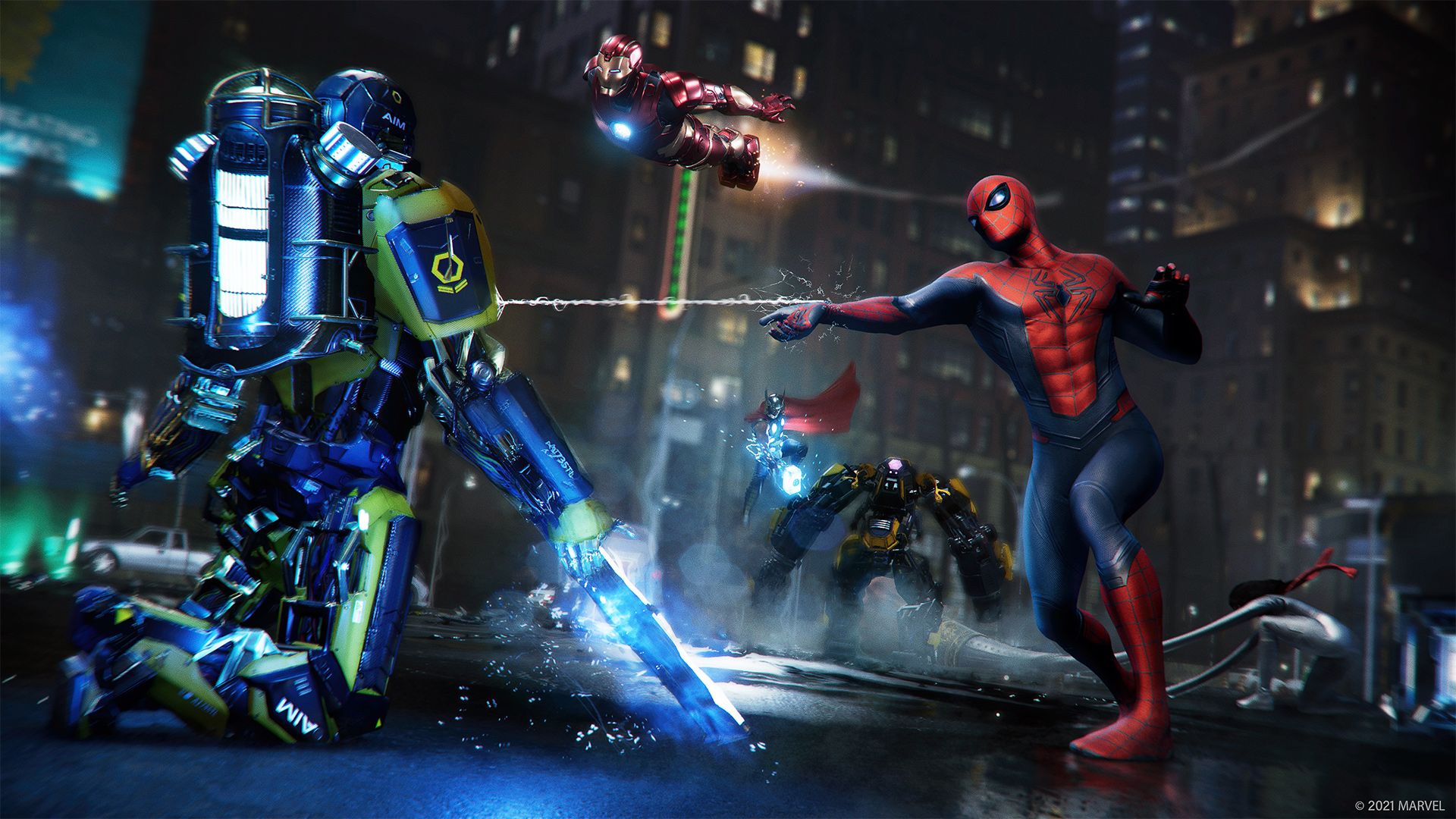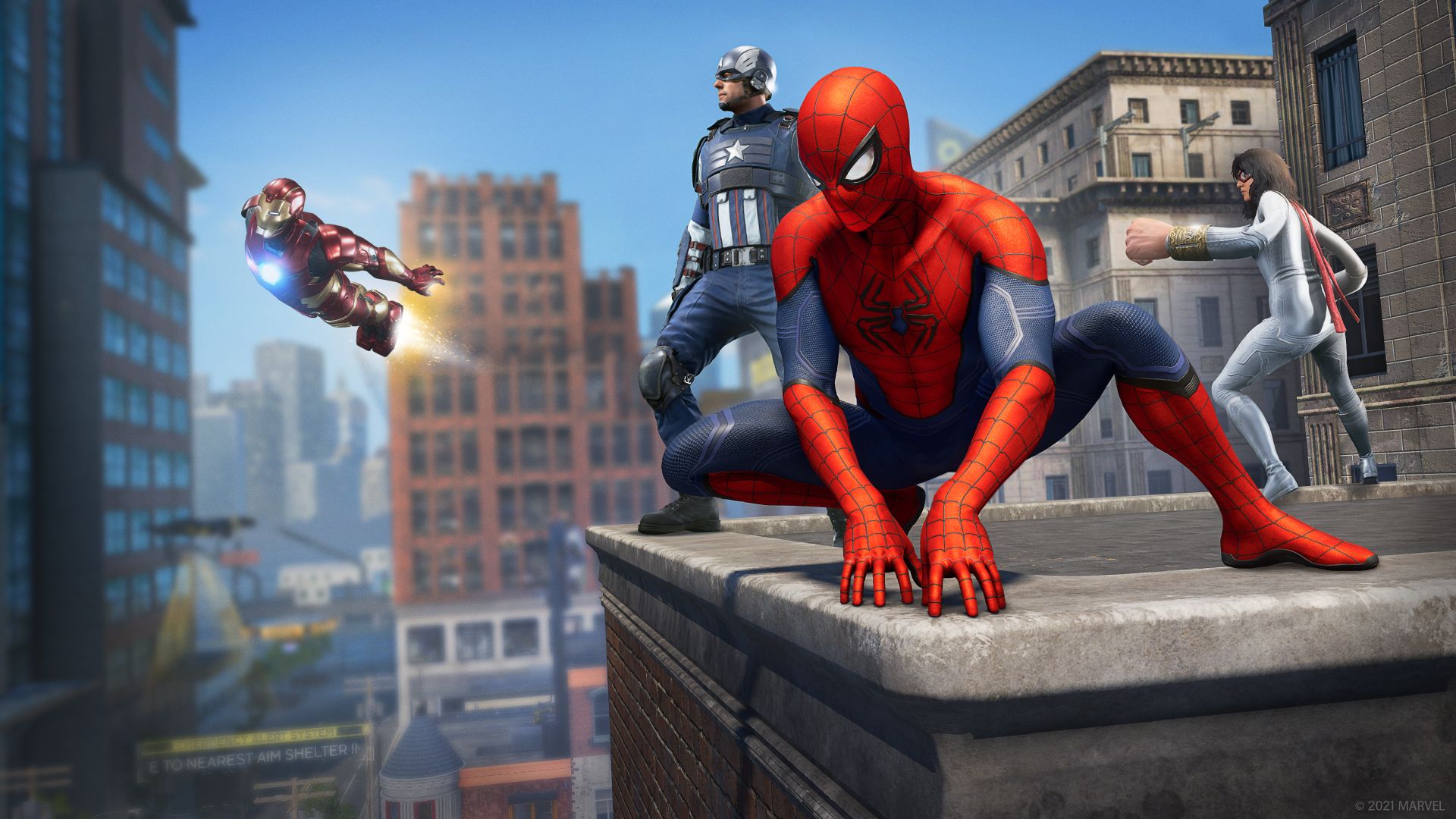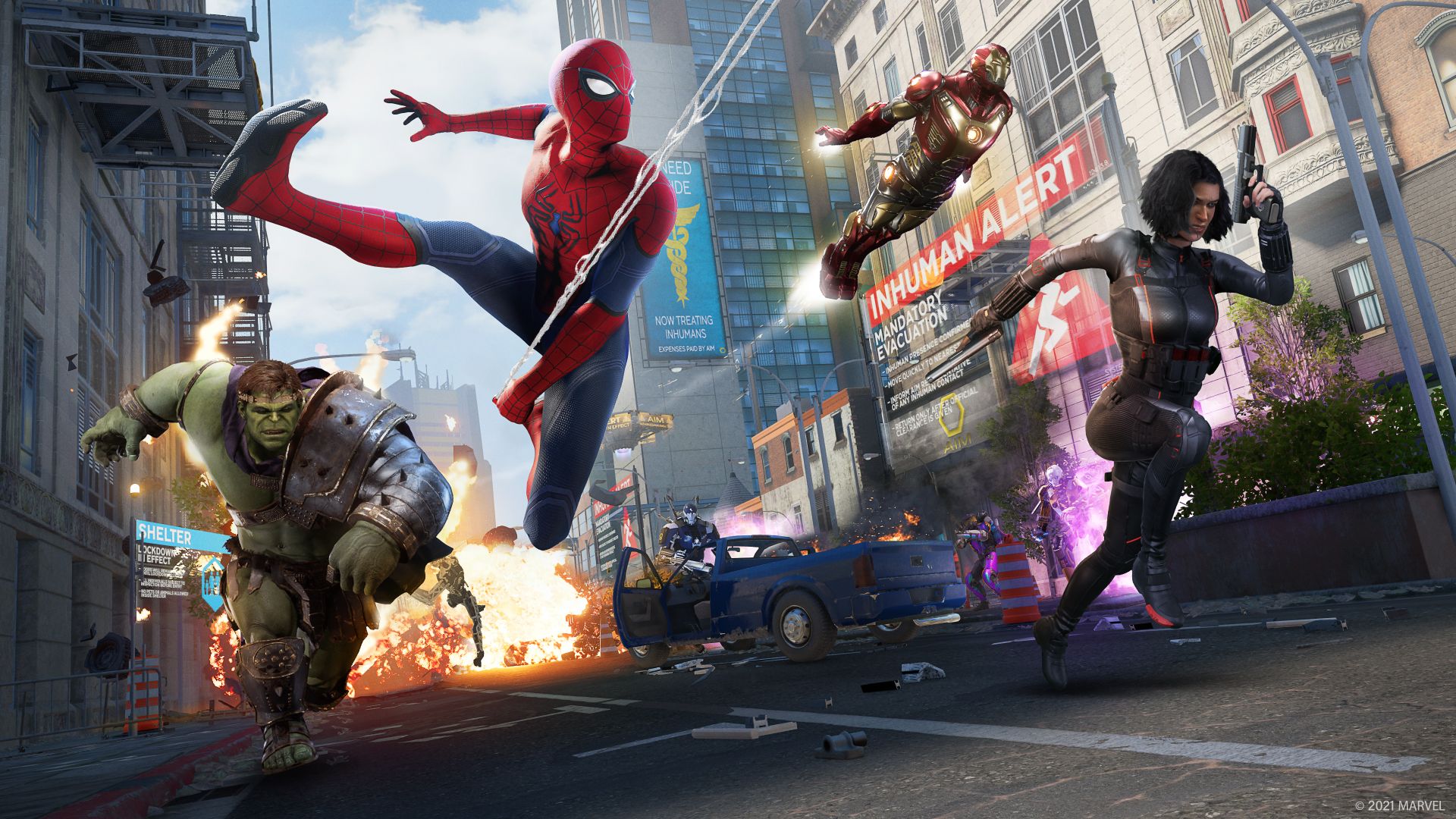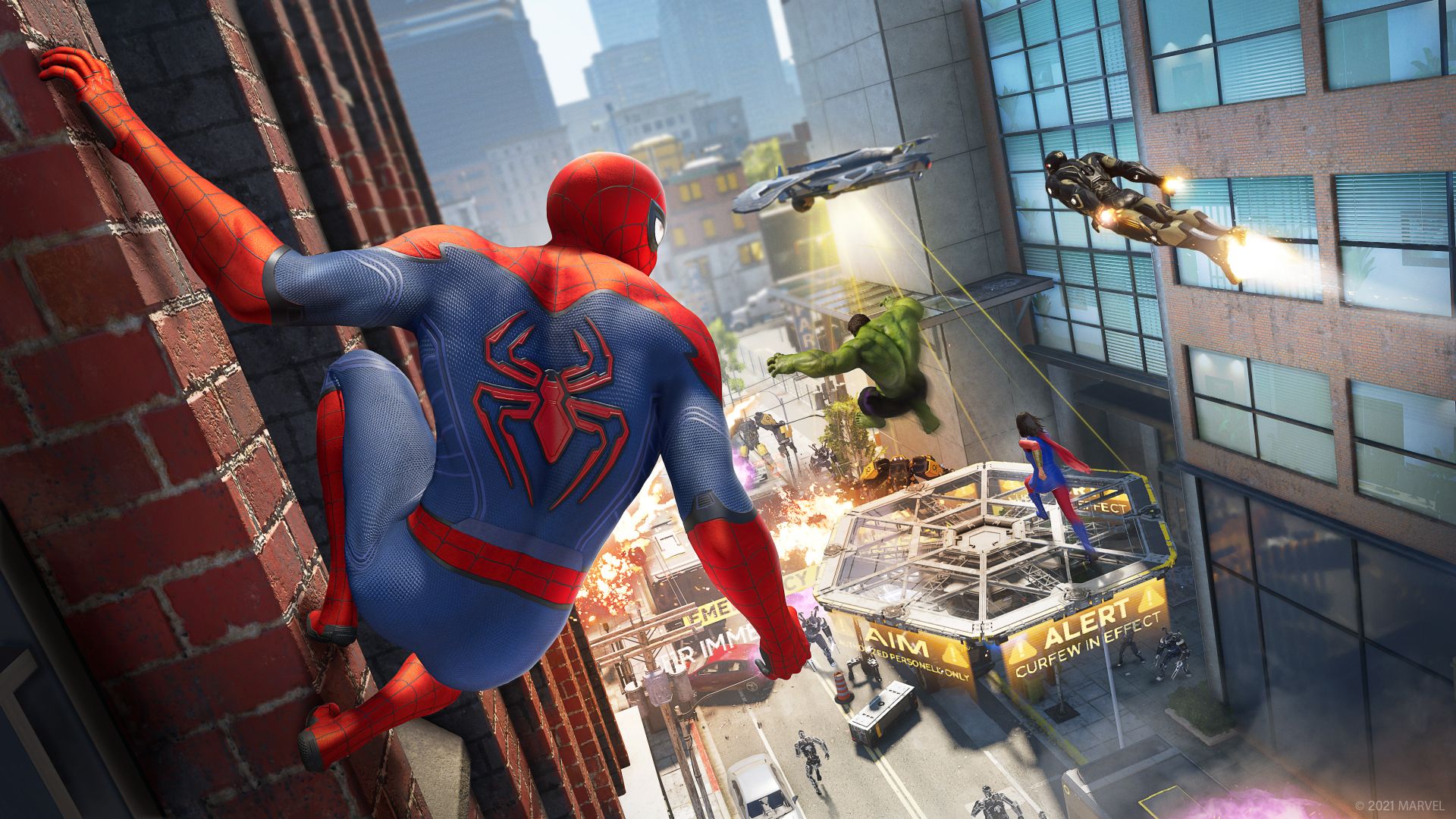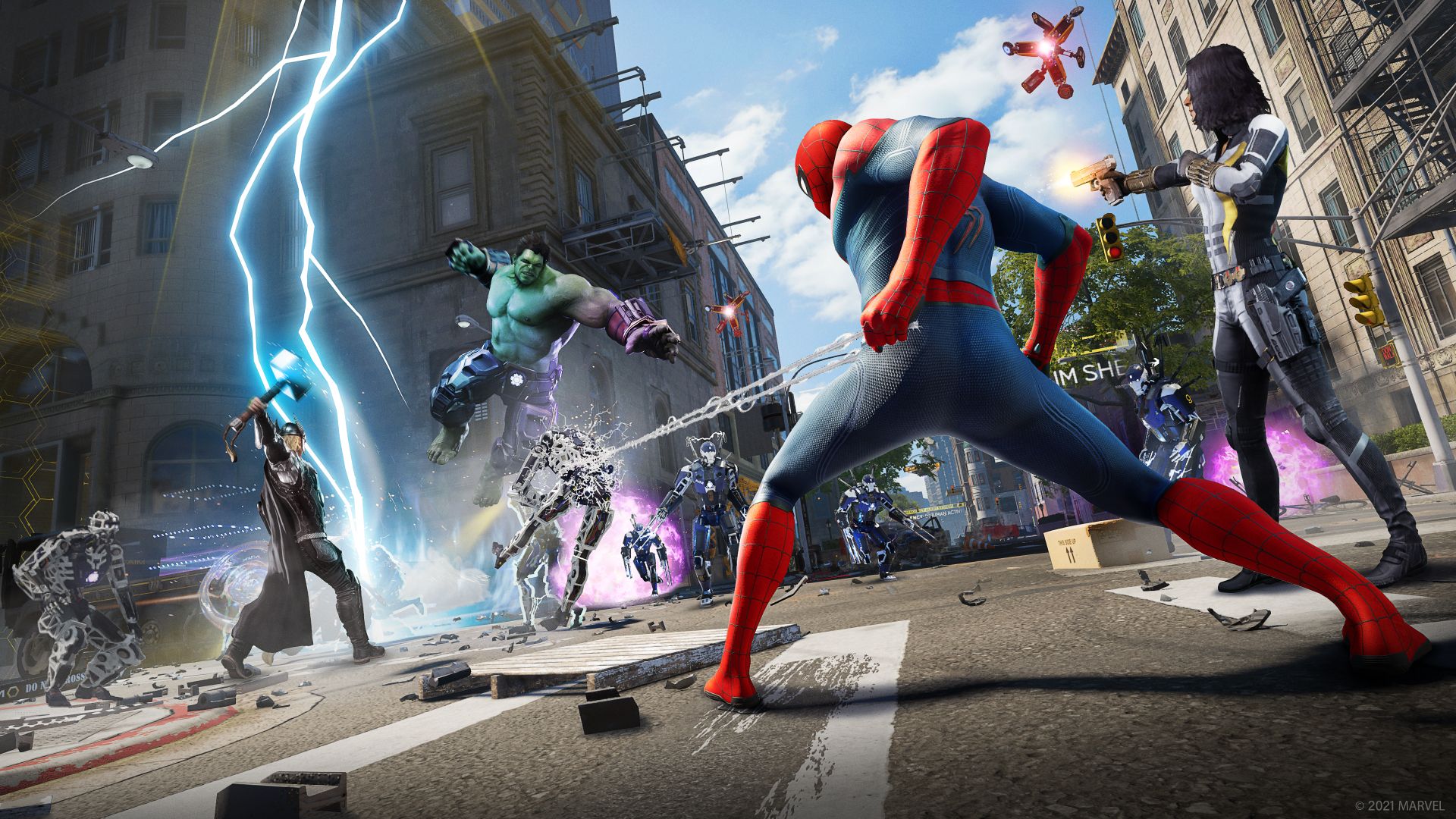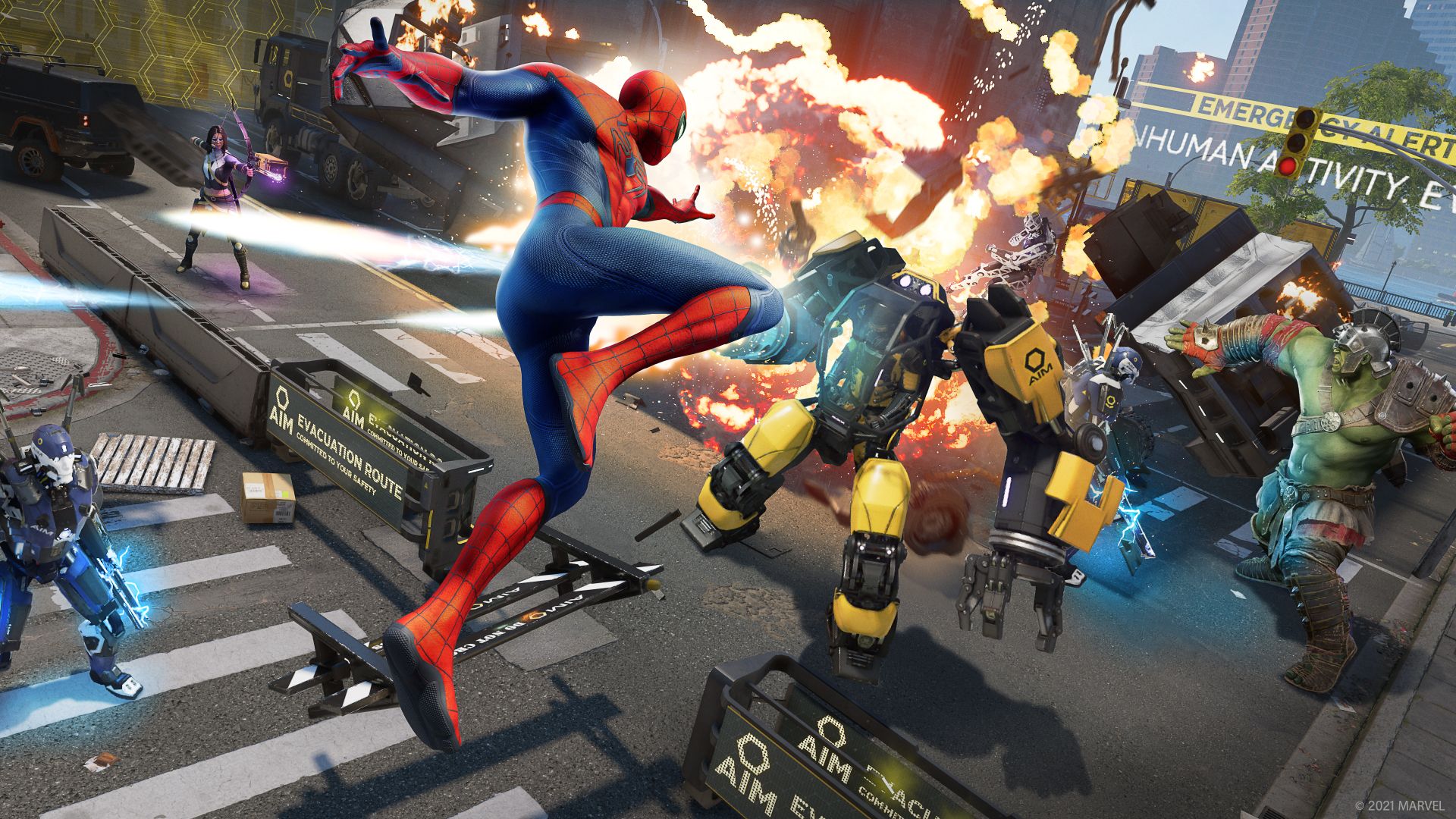Sean Chiplock starts the interview off with a joke. "Is this one of those new AIM technologies?" He quickly asks in response to the Zoom call's automated voice telling the room that recording has started. He'll admit that humor is his defense mechanism, but you wouldn't be able to tell from the tone of his voice. Less than a decade in the business, Sean Chiplock has already built an impressive career, winning acclaim and recognition for popular characters like Breath of the Wild's Revali and Persona 5's Yuuki Mishima. Next up, he's the latest in a long line of Spider-Man actors, playing the Marvel's Avengers incarnation of the character.
It's a nerve-wracking experience for everyone as all eyes are on Spider-Man's long-awaited arrival in Marvel's Avengers' following its disappointing debut, but Chiplock comes off cool and effortless as he discusses his love of Marvel's iconic web-slinger -- just like Peter Parker would. What followed was a wonderfully frank, personal discussion with Chiplock and Crystal Dynamics writer Jessica Krause about not just the importance of Spider-Man, but the deeply human aspects of the character that make him relatable to any reader.
Spider-Man's pretty well known for his sarcastic sense of humor. How much of you is present in that humor?
Sean Chiplock: The humor was relatively easy. Comedy is a big part of my life, but it's also a big part of my safety net. I use comedy to connect with people as much as I do to protect myself: it's how I mask a lot of my fears and a lot of my nervousness. If you can make a joke out of something or make light of something, then it's a sign that you're able to approach it and handle it without it affecting you so intensely that you can't deal with it.
A huge part of being able to identify with Spider-Man -- and convince myself that I was capable of bringing something realistic and believable to the character -- stemmed from finding confidence through my nervousness. It was this idea that it's okay if you're not perfect or you're scared. I'm pretty sure this kid just out of college is probably not feeling 100% prepared for situations where he has to do things correctly or else people will literally die.
Peter's not even sure who he is yet. He doesn't fully understand what he wants to do or what he needs to do. He's thrust into these situations where he has to know what he's doing because it's just him and there can be lifelong consequences. That's the groundwork I used for this character. There will be moments where you feel confident that you know what you're doing and you can put the superhero mask on and play that role. That doesn't mean when the facade falls and you feel unsure or insecure that it's bad. That's going to get to the real meat of the character. We see this side of him that isn't necessarily universal across the Avengers. He's one of the only characters that you can have these moments of weakness where there can be life-changing moments for him.
Thanks to Marvel's Spider-Man and the MCU, Spider-Man is a really hot property right now, but he's always been a household name. What contributes to that long-lasting appeal?
Chiplock: I have to fall back on what my dad said about Spider-Man being one of his favorite characters. Superman is cool, but it's easy to be cool when you're perfect at everything and you don't have to worry about dying. Batman is cool because he doesn't technically have superpowers, but he's got a lot of money, and as a middle-class individual, I can't identify with what it's like to have more money than you'd ever know what to do with. Spider-Man is just a dude. He's a guy who has powers, but he doesn't automatically feel powerful. I would say he feels more daunted by those powers than he empowered. He's like, "Oh, great. This is something else that I have to gain control of and not abuse, and not let it become my entire personality." There's even a little bit of bitterness behind that. This is not something he can choose not to have; he has to live with it and all of the implications that it has for his social life -- what he is allowed to share with people, how vulnerable he's allowed to be, and who he's allowed to be vulnerable around.
Imagine if you were told that the only person you're allowed to talk about your woes to is a colleague at your workplace and nobody else. That's honestly the case with Peter Parker. He doesn't even get to talk about his life with people his age, which is very off-putting at times. I love the idea that he's one of the most human members of the Avengers, where he has a divide between who he has to be and who he wants to be. There's this constant battle about which he has more time for, which is demanding more of his attention. We're seeing two different types of character development simultaneously between Peter Parker and between Spider-Man, and I think that's really cool. You've got a little bit of the superhero for people who like that kind of story, but you've also got the more human element for people who like to connect with the human side. Anyone can be Spider-Man, anyone can have these feelings of insecurity and anyone can find the strength to power through situations where they may initially feel powerless.
How do Spider-Man and the "With Great Power" Hero Event integrate into the existing content and team?
Jessica Krause: Spider-Man was the first content that I worked on, which was intimidating. I think what makes Spider-Man so great is his vulnerability. He's the everyman of the group. You have Cap and Thor, who are these pinnacles of masculinity, or Tony Stark and Bruce Banner, who are geniuses in their own right. You can find relatability within these characters, but it isn't the core part of who they are.
Peter Parker has always been the most relatable superhero. Going back to his first appearances in the 1960s, he's just a normal kid who fell into these circumstances. I think that allows him to be more relatable for audiences, and that's why he's resonated with people for so long. That vulnerability within Peter allows us to tease vulnerabilities out of the other characters. Peter is so relatable because he tries to be as personable as possible with all these other superheroes. It's like, okay, how do I relate to you? I'm going to start a Dungeons & Dragons group, do you want to join? It's finding these moments and finding the humor within the other characters through his brand of self-deprecating and fumbling sense of humor.
Spider-Man has been a great addition, particularly for Kamala, who is our POV character. Age-wise, he's a senior in college, so he's right between Kamala, who is the youngest of the group, and then probably Kate. I think his friendship with Kamala is nice because he's the closest to her age currently, so it's nice for her to have someone she can talk to in her age group. And he's someone she knows about because she's lived across the Hudson and watched this guy blow up for the past five or six years. He's also someone she can joke with about the other Avengers and talk about all these older adults. It's been amusing to add him to the group and see how he changes those dynamics.
Kamala has been a highlight of the game. In the comics, she's not known for having had a ton of interaction with Peter, so this may be the first time many players see those two characters together. What was it like writing those interactions?
Krause: There's a really fun crossover comic [2019's Marvel Team-Up #1-3 by Eve L. Ewing, Joey Vazquez, Moy R., Felipe Sobreiro, and VC's Clayton Cowles] I found when I was doing my research. It's a really short but fun body-swap story where Kamala and Peter switch bodies and have to figure out how to undo it. I found it when I first got put on Spider-Man, and it was perfect.
Peter is older, but he's not that much older. Obviously, the way you talk to a high school student when you're in college is not the same. There's definitely a bit of a generational gap there. But there's still a cusp between millennial and Gen Z where it's like, "Oh, I'm a pure millennial, but there are some things from Gen Z that I can get down with." It's been a really interesting relationship for them to foster. In our Avengers family tree, we have Peter as the friend from camp. You don't see him all the time, but every summer, you get to see them again, and it's like no time has passed at all.
What versions of Spider-Man did you both look at to find the inspiration for the character?
Chiplock: I wanted to have some foundation based on what I liked from past performances to use as a template before I added myself into the mix. My wife and I are really big fans of the Marvel Cinematic Universe. We enjoy how a lot of the actors portray their characters there, so I did use that as a base. But one of my big fears was that I didn't want to do a one-to-one replication. Then it just becomes an impersonation. Either you do the impersonation great, and everyone goes, "Oh, yeah, he reminds me exactly of this other person who I am now thinking of instead," or it's not a good impersonation. Then people say, "Oh, they sound like they're trying to be blank and failing miserably," and that just hurts!
I found I wanted to embody Spider-Man, and it turned out that I shared a lot with him -- whether it was the nervousness or that feeling that you're out of your league. Even the sensation of having a massive amount of life responsibilities dumped on you earlier than you think you should have been exposed to them. There was a loss of family members that I dealt with early on in high school that I'm very confident put a level of responsibility on me that people should not have to deal with during that age range. I'm grateful for how it taught me to care for myself and be responsible, but there's still going to be that thought of, well, why couldn't I just have the life I wanted to have? Why couldn't I develop the skills or the social aspect that I wanted to have for myself? Now it feels like I'm trying to play catch up: I'm trying to acquire these life skills that I should already have at this age, but real life had other plans for me. I feel like that helped significantly with bringing a sense of humanity and authenticity to Peter Parker/Spider-Man. I was able to relate because it isn't unusual.
This is a real thing that people go through, and it's a part of his character development through this story arc. I didn't feel afraid to explore that. If anything, that makes him easier for audiences to connect to because they see that he's not just a perfect superhero. He has moments of weakness, and that means he can be like us. More importantly, someone like me can be like him. That's where the audience's connection with the character comes in, which is important to be immersed in the story and believe something fantastic or supernatural.
Krause: There wasn't any specific run that we looked at. Spider-Man is so iconic and there is so much content, so we didn't want to pigeonhole ourselves into one comic interpretation of the character. It was a lot of like reading single issues. We'd read a couple of issues from the '60s, then read a couple from the 2000s. We'd find the issues where he interacts with the Avengers because that was going to be a huge tentpole for this pack. Looking back at all the other versions of Spider-Man we've seen in media, my personal favorite is Peter B. Parker from Spider-Man: Into the Spider-Verse.
Into the Spider-Verse is one of my favorite movies of all time, but obviously, we can't write that. That Peter is at a different point in his life from ours -- he's like 40 years old and divorced. He's gone through a lot more than our Peter Parker. It's been a lot of just cherry-picking certain issues out from iconic runs and finding what kind of voice those versions of Peter have and how we can incorporate that while adding our spin to it.
The Spider-Man we see in "With Great Power" is in his 20s, which is a little older than most interpretations we've seen as of late. How did that age range affect the performance?
Chiplock: There are things I understand as someone who has been in that age range and things that I have to hope the audience understands. I hate to admit this, but I'm not quite college-age anymore! My voice type still sounds college-age. I've had people hear me talk and they'll ask if I'm still in high school. I know, personally, that it's possible to be older and still have a high-pitched voice, so I didn't try to focus too much on the vocal print of Spider-Man. I focused more on the performance and the personality. That being said, I've already seen people saying he sounds younger than what they expected.
I think the crucial part that I focused on is his being college-aged. College was the defining era of young adulthood, at least for people of my generation. You have four years to figure out who the hell you are and what you want to do because if you finish college and you don't know, there's no one around to help you anymore. Real-life just started. Have fun, go enjoy yourself or don't: we don't care anymore. College was supposed to be this time when you discovered yourself, where you learned about your habits and your tics and preferences and how you handle different situations. It's where you pursue your interests and set the stepping stones of your future career. And then -- and I think this is relevant because Crystal Dynamics wrote Spider-Man to be a college senior -- but right after college is the first time people don't have an itinerary set out for them every day. They wake up, and there's nothing to do except what they choose to do. That can scare a lot of people who suddenly feel dumped with no sense of guidance.
College-age is a time where it's so important to have time to yourself, and that's one thing Peter has not had. He's had these powers since he was 16. He had all the responsibilities that these powers have required since he was 16. College is a time to be selfish because you need to spend more time on yourself than on anyone else around you, but Peter Parker is dealing with situations where if he's too selfish, people will die and he'll be responsible for it. That's a hell of a lot to think about. Here's this kid who hasn't had the time to properly grow into being an adult. He's constantly at odds with the things he hasn't had time to learn and figure out for himself. The things he has had to learn are being forced upon him.
It's rough. He doesn't want to lose that sense of himself. He likes his interactions with the Avengers, but he wants to be more than just an Avenger. He wants to be his own person. He wants to have a sense of identity. He doesn't want to be the 100% of the time perfect superhero. Steve Rogers is right there: that guy is iconic. You can't get any better than that. Thor is a living legend. Peter doesn't think he can be him. He's got to be himself, but he hasn't had a chance to figure out who that is. It's that mentality of, "Well, how much of me is actually the person I want to be? And how much of me is acting a certain way because that's what I have to do as Spider-Man?" I feel like there's a real opportunity for people in that demographic to identify with that. It's a point in life where you're trying to figure out who you are and who you need to be and manage time for both of those. I think that's one of the most interesting aspects of his character.
Krause: The end of college is this weird, liminal space where it's like two roads diverging. You're at this standstill of who you will be as a person. I went to college in New York City, and I had to move back home because I just couldn't afford to live. Having Peter at that point in his life was important because it speaks to him. It speaks to him as a character because one of the iconic things about Peter Parker is that he is always down on his luck. He is trying to constantly fight that balance of the personal and the superhero. It helps that there's a natural place in people's lives where that will just naturally happen.
Obviously, "With Great Power" could just be the beginning of several Spider-Man adventures in Marvel's Avengers. I know nothing has been revealed beyond Patch 2.2, but where would you like Spider-Man to go next?
Chiplock: Disney World. I think he just needs an honest to god day at a theme park. I need there to be an event where a ride almost gets broken, and someone ends up in danger -- not because of a villain, just because of something malfunctioning. So he's able to use his powers to save the day, and they thank him, and they're like, "Please, you have to let us do something for you." And he's like, "I could really go for a churro." And it just ends with a scene of Spider-Man, carefully, sneakily eating a fresh churro from a cart at Disney World, and it's the happiest he's ever been since he's had those powers. That would be the perfect mix of including the superhero action and letting a kid be a kid.
Krause: Then he would have the pizza at Disney. And then he can complain about the pizza.
Chiplock: That would be the post-credit scene. Where he's back on the Avengers' Helicarrier and Captain America is like, "So, how's the Disneyland pizza?" And Spider-Man laughs and says, "Oh, it sucks."
Krause: There are so many pizza jokes because I'm living vicariously through Peter Parker. Nothing will beat a New York-style pizza. Dollar slice pizzas are where it's at.
Spider-Man and the new Hero Event, "With Great Power," swing into Marvel Avenger's Nov 30, exclusively on PlayStation 4 and PlayStation 5.

